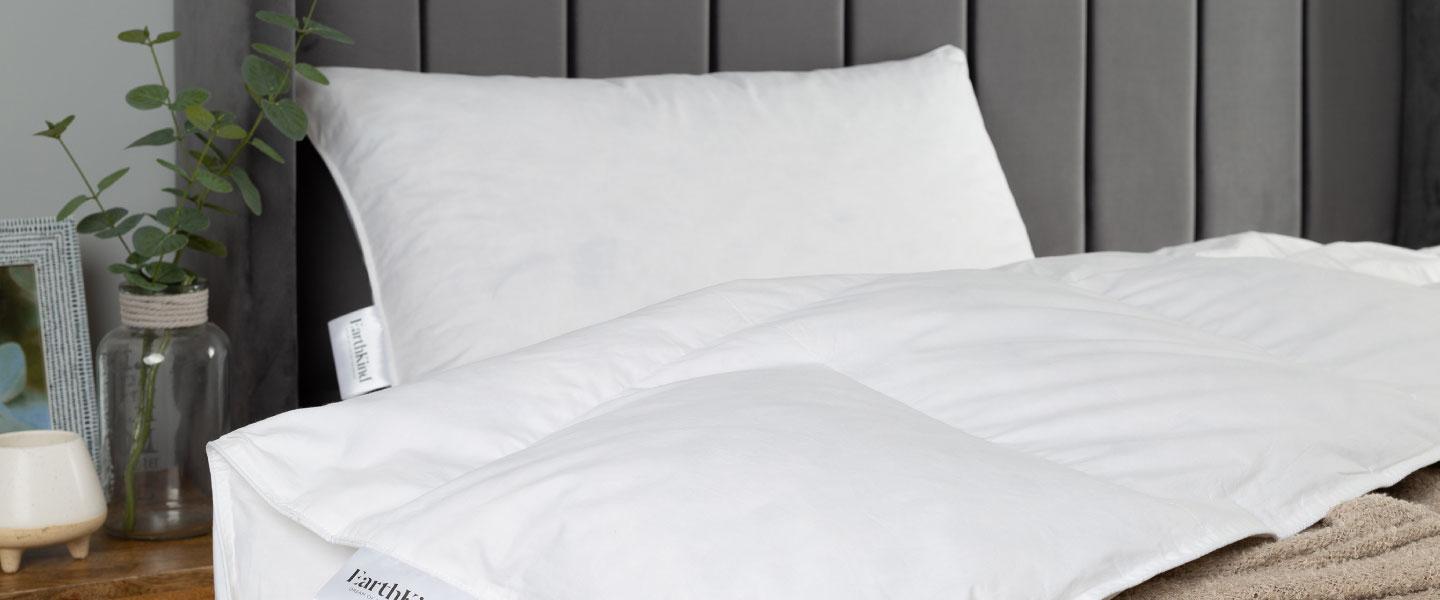Synthetic vs Natural Filled Duvets: Which is Best for You?
Are you trying to decide between a synthetic or a natural filled EarthKind™ duvet to keep you warm and comfortable while you sleep? Perhaps you’re unsure of which would better suit your needs or what the actual differences are. Read on to find out more about the filling options available in the EarthKind™ range, and whether a synthetic or natural duvet is best for you.
EARTHKIND™ SYNTHETIC DUVETS
A synthetic filled duvet simply refers to any duvet that is filled with man-made material rather than a natural material. While natural materials such as feather and down have been used to provide insulation in clothing and bed coverings for centuries, synthetic materials are a relative newcomer on the scene.
Just like with any other invention, some people are resistant to move from a more traditional natural duvet to a synthetic product. However, manufacturing techniques have advanced in leaps and bounds in recent years and increasing numbers of consumers are opting for the more modern synthetic option for a variety of reasons.
EARTHKIND™ HOLLOWFIBRE DUVETS
Hollowfibre is one option for anyone looking to purchase a product with synthetic filling, and it’s what is used in the Earthkind™ synthetic duvet. The term hollowfibre in this case is used to describe a synthetic filled duvet with spaces between the internal fibre filling. These spaces are what give the duvet the "hollow" component of its name.
Hollowfibre duvets have proved popular thanks to their breathability and relatively light construction compared to other types of synthetic duvet. This type of covering helps sleepers stay warm without being too heavy or overwhelming and are also a go-to for those who suffer from animal allergies, as well as vegan consumers.
EARTHKIND ™ NATURAL DUVETS
A natural filled duvet is the more traditional option. The Earthkind™ natural duvets are filled with 100% recycled feather and down, and are highly effective at keeping the sleeper warm and comfortable even when the temperature begins to drop.
Some people prefer the more natural feeling of this kind of feather duvet and will choose this more traditional type of duvet as it is made up of completely natural materials, rather than the man-made option of hollowfibre.
EARTHKIND™ FEATHER AND DOWN DUVETS
Down refers to the small, fine feathers that are found on the breast of ducks and geese, underneath the outer, denser, waterproof layer of feathers. They provide warmth and insulation to the duck or goose, and so they have been used for hundreds of years to provide warmth and insulation to humans too, most notably in clothing and bedding.
A luxurious feather and down duvet from EarthKind™ is unlike the majority of natural duvets on the market, due to the fact that it’s made with 100% recycled feather and down for a responsibly sourced duvet that’s kinder to the environment. The feather and down is sorted and cleaned, before being sterilised and heat-treated. This filling is then repurposed into a brand new, fresh premium blend of 85% feather and 15% down that’s been rigorously checked to ensure it meets the highest quality standards.
WHICH EARTHKIND™ DUVET FILLING IS BEST FOR YOU?
So, this brings us to the crucial question: synthetic vs natural EarthKind™ duvets, which Is best for you? There are a number of different factors to consider here.
SYNTHETIC DUVET ADVANTAGES
- Synthetic duvets tend to be more cost-effective than a naturally filled product
- Synthetic duvets provide a lighter sleeping experience for those who like to stay a little cooler when they sleep
- This also makes synthetic duvets more suitable for usage during summer or when the temperatures are warmer
- Synthetic duvets tend to be better for people with certain allergies such as feather and pet dander
- Vegetarians and vegans may prefer a synthetic option, as these fillings contain no animal products
SYNTHETIC DUVET DISADVANTAGES
- Budget synthetic duvets might not provide the warmth and insulation you need for those colder nights, although the EarthKind™ synthetic range has been designed to provide the same benefits as their natural alternatives
- Depending on your sleeping preferences, you may find synthetic duvets to be a little on the lighter side, not providing the substantial weight that other duvet types such as feather and down offer
NATURAL DUVET ADVANTAGES
- Duvets with a natural filling tend to be warmer than their synthetic counterparts
- Many people prefer the traditional feeling of a naturally filled duvet
- Feather/down duvets with a cotton cover mean the whole duvet is made from fully natural materials, rather than man-made synthetic fibre filled duvets
- This type of duvet might not be significantly more expensive than a higher-end synthetic product
NATURAL DUVET DISADVANTAGES
- Some may find these duvets a little heavier than synthetic products, and this may not be suitable for all sleeping habits
- Vegetarians and vegans may not find natural fillings suitable, due to the down and feather content
- Natural duvets may trigger allergies in some sleepers
- As a general rule, natural filled duvets are more expensive than synthetic duvets
THE ROUNDUP
So, EarthKind™ synthetic or EarthKind™ natural duvet range – which is best? Hopefully you have gained a clearer insight as to the differences between the two types of filling after reading this guide. Ultimately, whether you opt for a feather and down EarthKind™ natural duvet, or a hollowfibre EarthKind™ synthetic duvet is down to your personal preference and what aspects are most important to you when choosing to invest in a new duvet. Whichever you choose, you can rest assured that the entire EarthKind™ range has been crafted with the upmost care and attention to detail to provide a luxuriously ethical sleep experience.



